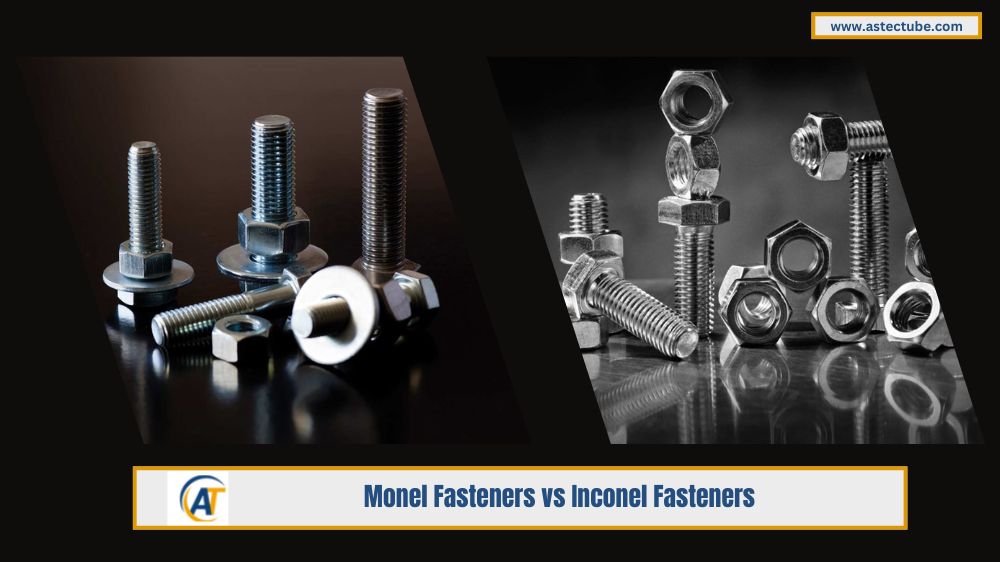Fasteners are small parts, but they play a big role in holding machines, structures, and systems together. In heavy-duty industries like marine, oil and gas, aerospace, and power plants, fasteners must withstand high stress, heat, and corrosion. That’s where materials like Monel and Inconel come in. These special alloys are built for tough environments. Knowing the differences between them helps engineers and buyers choose the right fastener for the job.
What are Monel Fasteners?
Monel fasteners are made from a nickel-copper alloy. The nickel content is usually around 65%, with copper making up most of the rest. Other trace elements may be present for added strength and performance. Monel fasteners are known for their excellent resistance to seawater and many types of acid. They also handle pressure and impact well.
Two common Monel grades are Monel 400 and Monel K500. Monel 400 is strong and resists corrosion. It’s good for most marine and chemical processing uses. Monel K500 is even stronger due to added aluminum and titanium, which makes it more suited to high-load applications.
These fasteners are mostly used in shipbuilding, offshore equipment, chemical plants, and piping systems. They hold up well in wet and acidic settings.
What are Inconel Fasteners?
Inconel fasteners are made from nickel-chromium superalloys. These materials can handle both heat and corrosion. Most Inconel grades also include iron, molybdenum, and small amounts of other metals.
The most widely used grades are Inconel 600, 625, and 718. Inconel 600 performs well in high temperatures and has good corrosion resistance. Inconel 625 is stronger and more resistant to acids and oxidizing agents. Inconel 718 has higher strength and is often used in aerospace parts that face both heat and stress.
Inconel fasteners are used in gas turbines, exhaust systems, heat exchangers, and reactors. These parts often deal with high temperatures, pressure, and chemical exposure.
Key Differences Between Monel and Inconel Fasteners
Chemical Composition
Monel is primarily made of nickel and copper, giving it excellent resistance to many corrosive environments. Inconel, on the other hand, is a nickel-chromium alloy with added elements like molybdenum and iron. These added metals give Inconel its superior strength and heat resistance.
Corrosion Resistance
Monel performs well in seawater, salt solutions, and non-oxidizing acids like hydrofluoric acid. Inconel is better suited for oxidizing environments and strong acids where high temperature corrosion occurs. It is preferred in more aggressive chemical conditions.
Temperature Resistance
Monel can handle moderately high temperatures but may lose strength beyond a certain point. Inconel is designed for extreme heat and retains its strength and stability at temperatures above 1000°C. It is widely used in turbines, engines, and reactors.
Mechanical Properties
Inconel offers higher tensile strength, better fatigue resistance, and improved performance under stress. Monel, while strong, is more ductile and works well in low-temperature or impact-heavy environments. Inconel is preferred for heavy-load, high-vibration uses.
Cost and Availability
Monel is generally less expensive and easier to source for applications that don’t require extreme heat resistance. Inconel is more costly due to its complex composition and advanced performance in high-stress conditions. The choice often depends on project needs and budget.
Applications Comparison
Monel Fasteners
Monel fasteners are widely used in marine engineering, offshore structures, and shipbuilding due to their excellent resistance to seawater and salt spray. They are also common in chemical processing plants, especially where non-oxidizing acids are present. Other uses include heat exchangers, pumps, and valve components in corrosive environments.
Inconel Fasteners
Inconel fasteners are chosen for high-temperature applications such as gas turbines, exhaust systems, and jet engines. They are also used in nuclear reactors, aerospace assemblies, and chemical industries where both heat and corrosion resistance are critical. Inconel performs well in environments with high pressure and aggressive chemicals.
How to Choose Between Monel and Inconel Fasteners
Monel fasteners are suitable for environments where corrosion from seawater, brine, or non-oxidizing acids is a concern. They work well in marine, chemical, and oil field applications. Monel is a good choice when temperatures are moderate, and strength under extreme heat is not required. It is also more cost-effective for large-scale use.
Inconel fasteners are ideal for high-temperature and high-pressure environments. They are commonly used in aerospace, power plants, and chemical reactors. Inconel offers excellent resistance to oxidation and maintains strength at elevated temperatures. Choose Inconel when thermal stability and long-term durability are key.
Conclusion
Monel and Inconel fasteners are both made to last, but they serve different purposes. Monel is better for wet, corrosive environments. Inconel is best when heat and pressure are major concerns. Choosing the right fastener depends on the environment, load, and operating conditions. For specialized needs, it’s best to consult with experts or suppliers who can recommend the right material for the job.

